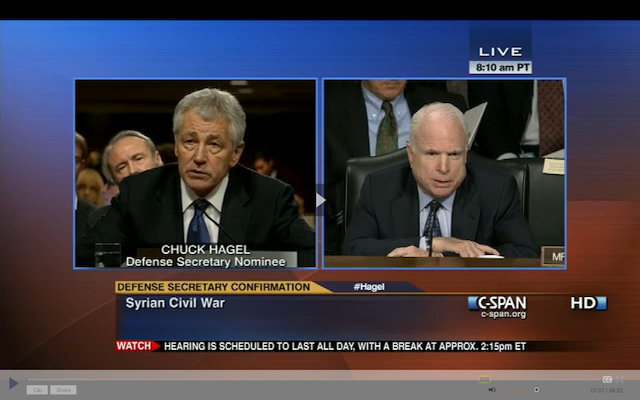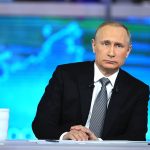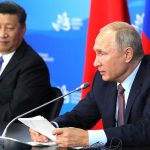by Wayne White
Sen. John McCain’s berating of former Sen. Chuck Hagel for “yes or no” answers as to whether the latter would support intervention in Syria or providing arms to anti-regime fighters reveals just how little McCain understands about how agonizingly complex these issues have been — and remain — for the US and other Western governments. In fact, perhaps the most profoundly basic need confronting the US and most of its allies (finding a credible Syrian opposition counterpart with which to work) has been elusive.
The Syrian opposition remains in disarray. All along, there have been disconnects between the new National Coalition for Syrian Revolutionary and Opposition Forces (more commonly referred to as the Syrian National Coalition) in exile, and the older, now associated, Syrian National Council (SNC) as well as what seems to be quite a few of the various armed rebels operating against the Assad regime inside Syria. Indeed, the National Coalition and its predecessor, the SNC, who now purportedly represent the overall Syrian resistance to the outside world, appear to most experts to be somewhat more moderate than many of the armed elements of what has been collectively known as the Syrian Liberation Army (SLA) fighting within Syria. Consequently, governments considering options as serious as those backed by Sen. McCain lack confidence that they have a reliable partner in the new Coalition.
Late last year, the Istanbul-based SNC was pressured by the US, the West, and many moderate Arab states to formulate an expanded and more thoroughly representative organization (because even some groups in exile remained outside the SNC). Leaders of the various factions in exile met in Doha, Qatar in November 2012 to attempt just that, and a new line-up, the National Coalition, emerged from that conference. If the succession of names and acronyms for the Syrian opposition outside Syria seems a bit confusing to the reader, this comes as no surprise; the opposition remains a disparate, in some cases only loosely associated, and quarrelsome grouping. And most informed observers feel that genuine unity within the Syrian opposition in exile, let alone between its many and varied elements fighting within Syria, had not even been achieved in Doha. Consequently, the US, (which was a key party pressuring the opposition to meet and reorganize in the first place), ironically withheld its recognition.
Further divisions within the council became evident just this weekend when senior opposition leader Moaz al-Khatib not only conferred with Russian and Iranian representatives in Munich, but also agreed to meet with Syrian Vice President Farouk al-Sharaa if the Syrian regime would work with the opposition toward a peaceful exit of President Bashar al-Assad. The offer conflicted with the Coalition’s recently reiterated position rejecting talks with the Assad regime, naturally producing grumbling from within the opposition in exile. The reaction on the part of many FSA fighters inside Syria was even more strongly negative, even though al-Khatib told the Russians and Iranians about the anger within opposition ranks over their support for the Assads.
An extremely troubling tendency for practically all outside governments supporting the Syrian opposition more generally has been the rising radicalization of FSA fighters on the battle lines throughout Syria. Indeed, extremist elements such as the al-Nusra Front (strongly suspected of being composed largely of al-Qaeda fighters) reportedly have consistently been in the vanguard of much of the toughest fighting in recent months, although it cooperates with armed rebel groups of differing beliefs out of necessity. So, al-Nusra, although seemingly the most effective anti-regime military force in Syria, was designated a terrorist organization by Washington in December 2012. Al-Khatib, on behalf of the exile Coalition, has urged the US to reconsider, but a change in US policy toward al-Nusra is unlikely.
Consequently, with its external leadership in some measure of flux, some rebel fighters still little known, and other elements battling in Syria considered dangerous, providing a large amount of lethal assistance has become even more problematic for most potential donors. Moreover, military intervention would be a far more difficult, militarily taxing, and costly proposition than it was in Libya for a variety of reasons. And Russia and China’s obstruction in the UN Security Council of any meaningful UN-sanction action against the Assad regime has been yet another major problem. Finally, there is the wide-ranging issue of various uncertain (and several potentially unwelcome) post-Assad scenarios to further complicate decision-making by governments toward providing lethal assistance to an opposition movement with which they otherwise share the goal of toppling Assad & Co. and ending the ongoing bloodshed and destruction.
With 60,000 Syrians already dead and more dying by the day, providing robust military aid to the opposition would appear, at least at first glance, a proverbial “no brainer.” But this abbreviated tour through the complexities of US, Western and moderate Arab considerations concerning this far more vexing issue should underscore why demanding instant “yes or no” answers from Chuck Hagel as to whether the Administration should move boldly toward either military action in Syria or the arms supply business was so inappropriate.
Yet, although unrelated to Hagel, it may have been a mistake for key governments supporting the Syrian opposition not to have started at least supplying greater quantities of arms to the FSA well over a year ago, despite some of the risks at that time too. This could have hastened the fall of the regime while minimizing what has now become widespread anger within the FSA (and among many anti-regime Syrians in general) over the West’s failure to do so. Moreover, at that point, fewer extremist elements of the FSA had emerged as strongly as they are now as the ongoing, savage struggle has radicalized ever larger numbers of opposition fighters. Viewed in hindsight, although this was a very difficult call even back then, it might have been a missed opportunity.





